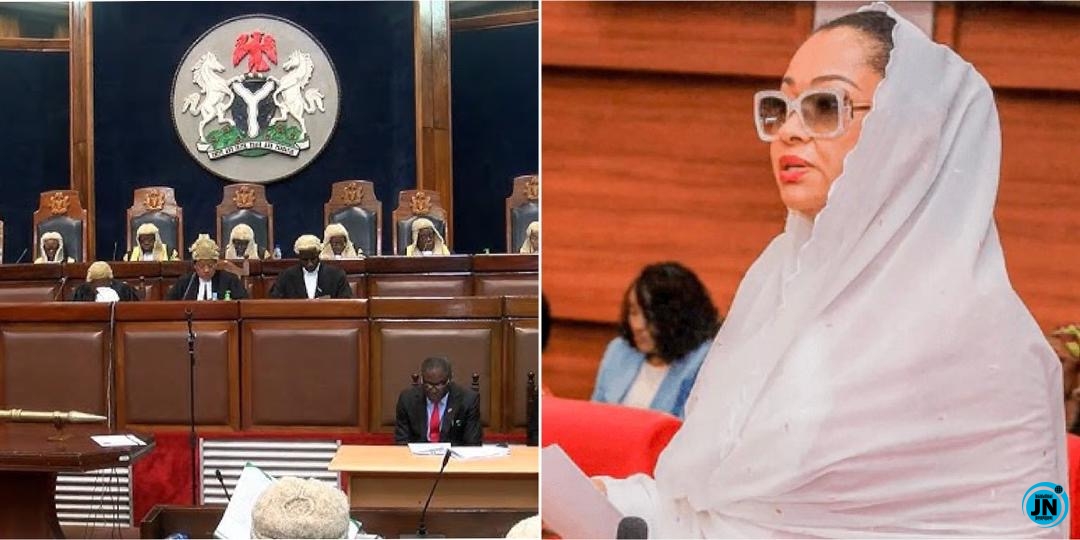
The Federal High Court in Abuja has adjourned the high-profile cybercrime trial of suspended Kogi Central Senator, Natasha Akpoti-Uduaghan, to October 20, 2025, following a preliminary objection raised by her defence team questioning the court’s jurisdiction over the matter.
Senator Akpoti-Uduaghan, who was arraigned on June 30, 2025, and subsequently granted bail on self-recognition, is facing a six-count charge filed by the Federal Government under the Cybercrimes (Prohibition, Prevention, etc.) (Amendment) Act, 2024. The charges allege that she knowingly transmitted false and injurious information through electronic means with the intent to malign and incite the public, actions considered criminal under Nigerian law.
Details of the Charges
The suit, filed by the Director of Public Prosecution of the Federation, Mohammed Abubakar, under FHC/ABJ/CR/195/2025, claims that Natasha Akpoti-Uduaghan transmitted electronic communications containing information capable of harming the reputations of prominent political figures. Specifically, the charges allege that the Senator’s statements referenced threats involving Senator Godswill Obot Akpabio, GCON, as President of the Senate, and former Kogi State Governor Yahaya Adoza Bello, creating potential public alarm and damage to their public standing.
One of the counts reads: “That on or about April 1, 2025, while addressing a crowd of people at Ihima Community, Kogi State, you — Senator Natasha Akpoti-Uduaghan — intentionally caused the following communication to be transmitted via a computer system and network, to wit: ‘…and Akpabio told Yahaya Bello, I am saying, standing by what I have said. He told him that he should make sure that killing me does not happen in Abuja, it should be done here, so it will seem as if it is the people that killed me here…’* And you, Senator Natasha Akpoti-Uduaghan, knew this contained a threat that could harm the reputation of Senator Godswill Obot Akpabio, GCON, as the President of the Senate of the Federal Republic of Nigeria. You thereby committed an offence contrary to Section 24(2)(c) of the Cybercrimes (Prohibition, Prevention, etc.) (Amendment) Act, 2024, and punishable under the same Act.”
Another charge similarly alleges that Natasha made statements capable of damaging the reputation of former Kogi State Governor Yahaya Adoza Bello, contravening Section 24(2)(c) of the Cybercrimes Act, which governs the transmission of false or injurious electronic communications with the intent to harm others.
Defence Objection and Court Proceedings
During the proceedings on Monday, prosecuting counsel David Kaswe informed the court that the prosecution was ready to proceed, noting that the first witness was present and that a television screen had been set up in the courtroom for the presentation of evidence.
However, Natasha Akpoti-Uduaghan’s lead counsel, Ehiogie West-Idahosa (SAN), raised a preliminary objection, arguing that the Federal High Court lacked jurisdiction to hear the case. He contended that the charges represented an abuse of the Attorney-General’s powers and highlighted that the defence had not been served with copies of witness statements, which he claimed hindered their ability to adequately prepare for trial.
Despite Kaswe’s insistence that the trial should commence, the presiding judge, Justice Mohammed Umar, ruled that the objection must be resolved before any further proceedings could take place. Consequently, the court adjourned the matter to October 20, 2025, for the hearing of the jurisdictional objection and the potential commencement of the trial.
Next Steps
The adjournment allows the defence sufficient time to argue their case regarding the court’s jurisdiction and ensures that procedural fairness is observed before the trial moves forward. Legal analysts suggest that the outcome of this preliminary objection could significantly influence the pace and direction of the trial, which has attracted national attention due to the high-profile nature of the accused and the seriousness of the charges under Nigeria’s Cybercrimes Act.
Observers and members of the public continue to follow the case closely, anticipating developments that may set important precedents for the application of cybercrime laws against public figures in Nigeria.